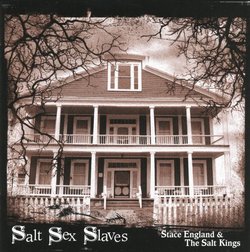Eclectic England Focuses to Rock the Effing Slave House
Shaun Mason | Los Angeles, CA | 12/03/2007
(5 out of 5 stars)
"After the ecelctic and sprawling majesty of his last effort, Greetings From Cairo, Illinois, one would assume that when Stace England decided he wanted to write an album of songs about The Old Slave House in Southern Illinois, where the cruel slave driver and breeder known as The Salt King ran his maddened household, that he would again run the gamut of musical styles, calling in a bevy of musicians who were all honored to play on such an ambitious work. And the error in this line of thinking would be trying to second guess the most eclectic and thoughtful songwriter in the state of Illinois. Anyone who thinks they know what England is going to do next is a fool or a lunatic. The rest of us know that the best thing to do is sit back and wait for what comes, let England work on his own time, and bask in the joyful result.
This record flat rocks. It rocks in a way that records, sadly, just don't anymore. They've taken England's incredible songwriting and played it against a rock and roll tapestry the way Mike Bloomfield, Al Kooper, et al, set Dylan's songs against a guitar-driven, beer soaked morass, from which you have to be led out by England's incredible storytelling, heartbreaking realism, and literary cleverness. The rhythm guitar swaggers and growls with open-G-tuned overdrive, the slide guitar screams and wails, and the rhythm section pounds forth on the back of the beat with relentless drive. If you don't know who I'm comparing them to, you need to start tracing rock history backward until you understand.
On my first listening, the emotion and poigancy of these songs hit me hard. This is a story of one of the worst periods in American history, that of slavery, and so few happy endings come out of that period that one would have to look hard to find them. England doesn't bother because his point is not happy endings that came out of slavery, his point was that there were people in America and a time in America when atrocity was the norm, and ignorance was the justification for it. Not only that, but it was no secret. Even the government participated in it. England holds up the legend of the Salt King like Sam Shepard's buried child, a rotten corpse pulled from the ground to reveal true horrors of slavery, heart-rending of lovers torn apart by capture and enslavement, the hedious gloating of men who kidnap a beautiful young woman and return her to slavery, a dastardly pastime of the Salt King.
Even the song in which the Salt King gets his comeuppance, delivered by a slave who reaches the limits of his tolerance and chops off the slave owner's leg with an ax, is sad. The man knows that his life will be forfeit, leaving him lynched by nightfall, and he gives his life for the chance to maim the Salt King, driving his ax against muscle and bone. The lesson to be learned in this story is that there was no good side to slavery, there was never any way for anyone to come out of it unscathed, nor should they have. England gives not so much a history lesson as a lesson in man's inhumanity to man in a historical setting, but that relates directly to the present day. In the time of the Salt King, the inhumanity toward those of a different skin color was justified by the riches of the salt trade, a commodity that was taken from the ground and made rich men of the few who controlled the many. The parallels to our current drive to take oil from the ground at the cost of as many lives as necessary are made with style, melody, and fierceness by England, which adds to the very raw emotion of this record. Just as the slave drivers were and the oil men are, England's rock and roll cry for someone to feel shame is relentless.
"


 Track Listings (13) - Disc #1
Track Listings (13) - Disc #1